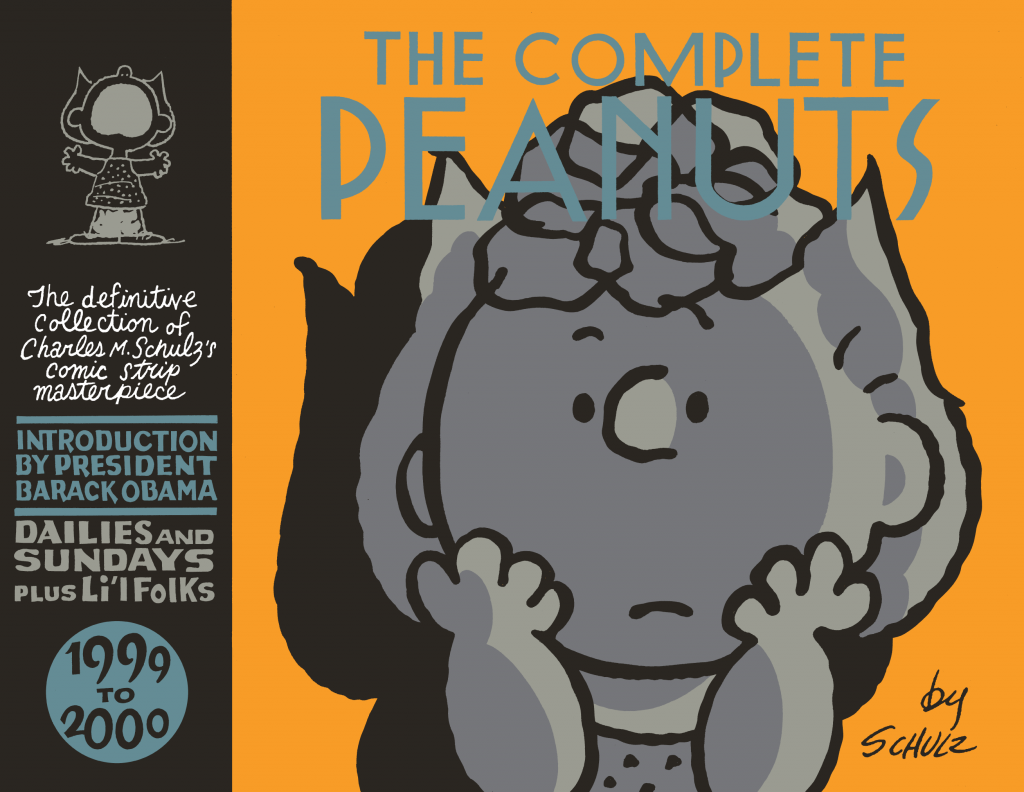You’d think he had enough on his plate, but US President Barack Obama has recently been announced as author of the introduction to the final installment of The Complete Peanuts reprint series. The twenty-fifth volume in the series includes not only Charles Schulz's final newspaper strips from 1999 and 2000 but also the Peanuts precursor, Li’l Folks, from the late 1940s. It’s out from Fantagraphics in May.
In chapters 3 and 8 of our book, we discuss the important role that reprinting programs have in constructing the value of cultural goods. For example, EC Comics looms so largely in our image of comics history because its comics were extensively reprinted by and for a dedicated fandom, while other (perhaps more typical) publishers of crime and horror comics have faded from memory. The way a publisher goes about reprinting a comic also says something about how it wants us to relate to the work. How is the work selected for the collection: is it comprehensive and chronological, or a selective “best-of”? How is the work presented: as a cheap entertainment commodity or an archival-quality volume that will grace your shelf for years to come? These features, which have nothing to do with the value of the work’s content nonetheless subtly determine our perceptions of its value.
Charles Schulz’s Peanuts was a fixture in American newspapers for fifty years, and the Peanuts characters circulated widely on television, licensed merchandise, and in inexpensive paperback collections. However, it also developed a following among art-comics connoisseurs by the end of the twentieth century. As Bart Beaty notes in Comics versus Art, alternative cartoonists like Chris Ware and Ivan Brunetti began to forward a very particular interpretation of Charlie Brown, Snoopy, and the gang as melancholic commentary on the human condition. It is this “version” of Peanuts—and not the one festooning greeting cards and shilling for Knott’s Berry Farm—that was named the second-greatest comic of the twentieth century by The Comics Journal. This is also arguably the version monumentalized in The Complete Peanuts.
Begun by Fantagraphics (also publishers of The Comics Journal) in 2004, The Complete Peanuts was an almost absurdly ambitious series, aiming to reproduce the entirety of Peanuts’ fifty-year history in twenty-five hardcover volumes. Each volume would comprise two years’ worth of strips, and they are also available in slipcased pairs. Notably, the cartoonist Seth designed the trade dress for the series, which in its systematized regularity and somber colour palette signals the seriousness with which Schulz’s life’s work ought to be read.
However, book design isn’t everything. All reprint volumes—and long-running series like this, in particular—also provide opportunities to build or exploit the social capital of a work by the inclusion of introductions. Even more so than promotional cover blurbs, these appreciations tie the reputations of introducer and introducee together—though the direction of the flow may vary! The twenty-six figures chosen to pen introductions to Peanuts (the fifth volume is shared by Whoopi Goldberg and Russell T. Davies of Queer as Folk and Doctor Who fame in the US and UK editions, respectively) are an eclectic list, including fellow newspaper cartoonists (Matt Groening, Lynn Johnston, Gary Trudeau, and Tom Tomorrow) with celebrities from outside the comics world like Alec Baldwin, Diana Krall, Leonard Maltin, Al Roker, and, yes, President Obama. While several of these figures seem to signal an alignment with nostalgia (Garrison Keillor and Walter Cronkite in the first two volumes), celebrities better known to the Gen-X and Millennial generations (Lemony Snicket, Patton Oswalt, Paul Feig, and the team behind Mystery Science Theater 3000) show up towards the back half of the series. The deployment of these celebrities, whose names are emblazoned on the front cover of every volume, balances out the “serious Peanuts” interpretation embodied in the books’ graphic design, ensuring that the reprint series will find an audience among readers who fondly remember Snoopy’s Tennis Book and Happiness is a Warm Puppy.
